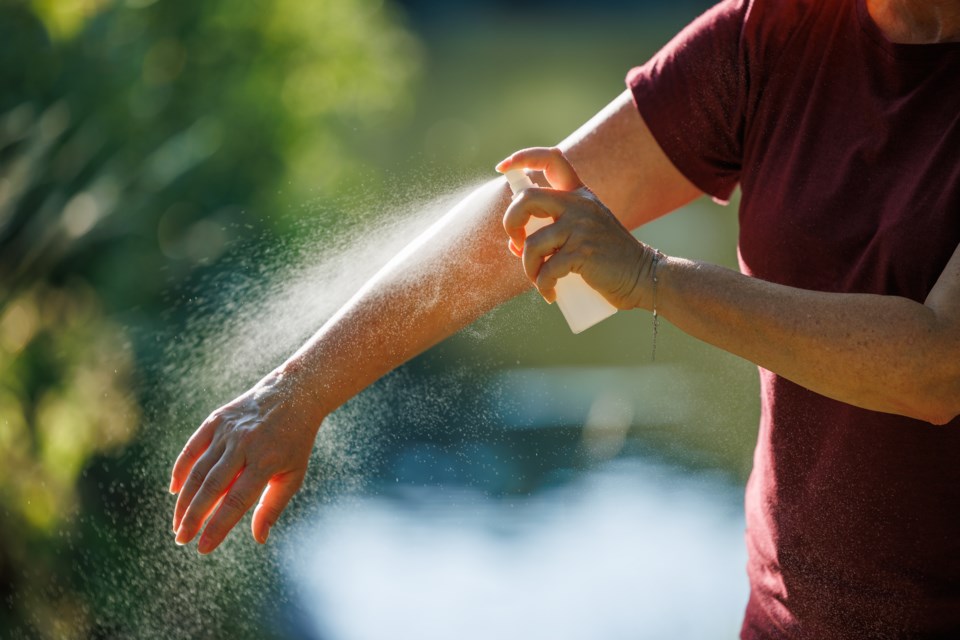The regional health authority is calling on locals and visitors in Squamish and Whistler to protect against mosquito bites in the wake of four people coming down with serious illness last summer.
A Vancouver Coastal Health (VCH) Public Health news release says that a small-scale mosquito surveillance pilot project is being launched in the Sea to Sky region “to better understand the local mosquito population and the viruses they carry.”
The pilot is a result of the illnesses detected in 2024 and is being done with BC Centre for Disease Control as well as with Líl̓wat Nation, Sḵwx̱wú7mesh Úxwumixw (Squamish Nation) and the University of BC.
Mosquito traps have been set up at select sites throughout the region.
The study will help update the list of mosquito species in the area and test mosquitoes for potential human pathogens, according to VCH.
Overall, the project will gather data that helps further assess risk and help tailor Public Health advice on precautions against mosquito-borne illness in the Sea to Sky.
Last year, the four patients who contracted the California Serogroup (CSG) viruses—specifically the Snowshoe Hare Virus (SSHV) and Jamestown Canyon Virus (JCV)—developed encephalitis, or swelling of the brain.
There are currently no vaccines available to prevent getting these viruses.
Not new viruses, but a concerning cluster
“While these are not new infections in the province, the number and severity of the cases triggered an investigation by VCH Public Health, which found that all four patients likely acquired the infections locally within the Sea to Sky Corridor,” the release states.
While these viruses have circulated for decades, typically from May to October, reported cases of human illness are rare.
VCH suggests that longer periods of mosquito activity may be linked to rising temperatures caused by climate change
“While we encourage outdoor recreation and activity, we’re advising residents and travellers to the Sea to Sky area to take preventative measures against mosquito bites, between now and fall; and if they do get bitten, to be aware of and seek health care if they develop neurological symptoms like confusion, seizures or severe headaches with fever,” said Dr. Moliehi Khaketla, medical health officer for VCH in the release.
Sea to Sky health professionals have been notified of the situation so they can consider if CSG viruses could be a cause for all severe neurological presentations of encephalitis and meningitis during the mosquito season.
“We’re also undertaking the mosquito surveillance project to learn more about the risk to the public,” said Khaketla.
Before the four cases last summer, only 10 cases of JCV or SSHV had been reported in B.C. since 2009, with only two in the VCH region.
“Serological surveys from other parts of Canada have found between one and 42% of the population show evidence of prior infection, which suggests these viruses may be a cause of mild summer viral illness and an under-recognized cause of meningitis and encephalitis,” the release states.
Serological surveys are tests on people, like blood tests for antibodies.
Health officials stress that, in most cases, CSG viruses do not cause symptoms.
If there are any symptoms, they typically show up between five to 15 days after the mosquito bite.
“They are typically flu-like, including fever, headache, fatigue, and occasionally nausea or vomiting, according to the release.
“Most individuals recover without the need for treatment, but in rare cases, the viruses can lead to more serious conditions such as meningitis or encephalitis, which may require hospitalization and a longer recovery time. Symptoms of meningitis or encephalitis may include confusion, seizures, and/or severe headaches with fever.”
How to protect yourself and your family
VCH Public Health provided the following ways people in the Sea to Sky can best protect themselves this summer and fall:
- Use mosquito repellent—Applying a mosquito repellent to areas of exposed skin is an excellent way to prevent mosquito bites. Check the product label for instructions on proper use. For more information about insect repellents, see HealthLinkBC File #96 Insect repellents and DEET.
- Wear protective clothing— Avoid dark clothing as it tends to attract mosquitoes. In areas with a lot of mosquitoes, wear full-length pants and a long-sleeved shirt.
- Install mosquito screens on windows—Consider staying indoors or in enclosed areas with screens when mosquitoes are most active or abundant, which is typically from dusk to dawn.
- Prevent mosquitoes from breeding—Anything that can hold stagnant water could be a mosquito breeding site, even small amounts. Identify and remove these areas on your property during mosquito season. This might include emptying saucers under flowerpots, changing water in birdbaths twice a week, unclogging rain gutters, draining tarps, tires and other debris where rainwater may collect, and installing a fountain in ornamental ponds or stocking them with fish. Backyard pools can also be a significant breeding ground for mosquitoes if not maintained regularly.




